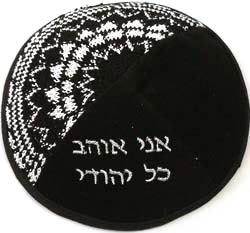Purim this year is Tuesday, March 10 (or March 11 in Jerusalem).
I have a great idea for your costume. It’s really easy, it’s very inexpensive, it takes under three seconds to prepare and it will go incredible, incredible lengths to promote Jewish unity. So what’s the idea?
Flip your lids. Swap your tops.
This year for Purim, wear a different kippah.
I f you wear a leather kippah, this year – for Purim – wear a velvet one. If you wear a velvet one, wear one of those Zionist knitted ones. If you wear a knitted one, find one of those cheap shiny white ones and wear it. Go into that drawer where you keep old kippahs, and grab that one that you would never wear. Just for Purim. If you don’t wear one, pick one and wear it for the day. I am not advocating those really crazy kippahs – that would miss the point. Just change your status quo… to someone else’s status quo.
f you wear a leather kippah, this year – for Purim – wear a velvet one. If you wear a velvet one, wear one of those Zionist knitted ones. If you wear a knitted one, find one of those cheap shiny white ones and wear it. Go into that drawer where you keep old kippahs, and grab that one that you would never wear. Just for Purim. If you don’t wear one, pick one and wear it for the day. I am not advocating those really crazy kippahs – that would miss the point. Just change your status quo… to someone else’s status quo.
For Jewish men, wearing a kippah is important as a sign of respect for Hashem and shows a constant recognition of G-d. But Jewish law allows a great deal of leeway as to what the head covering should look like.
However, for many observant Jews, a kippah is also a statement of who you are and with whom or what movements you are affiliated.
What if – just for one day – we changed the type of kippah that we wear? Would it help us see our fellow Jews from a different perspective?
This idea occurred to me recently when I inadvertently forgot to wear my (standard black leather) kippah when I walked to a neighbor’s house. Someone noticed my lapse and I asked to borrow one for the way home. They lent me a velvet “yeshivish” one. I put it on and walked home.
My family and friends were alarmed. Did I go “yeshivish”? What was I trying to say? (I was trying to say that I left my standard kippah at home. Nothing else had changed in the prior 30 minutes)
As we learn on Purim, one of the central mitzvahs of the holiday of Purim is “misloach manot,” or giving gifts of food to your friends. It is mentioned in the Megillas Esther. While there are different explanations, some sages note that its purpose is to promote unity among Jews, noting that unity was critical to our success against Haman and his plans.
This three-second costume – flipping your lid – can also promote unity as it will help us to realize that many of our differences are just external and may help us to see our brethren differently.
We learn that “senseless hatred” was the reason for the destruction of the Second Temple and that we need to eliminate this divisiveness to bring our Redemption. If we were to swap our kippahs for just one day and walk in a fellow Jew’s shoes, or kippah in this case, it might go a long way towards building the unity we lack.
The idea sounds easy. But will you do it? Who will be the first to do it?
Let me digress with a question: what was the name of the second person who jumped in to the Red Sea when the Jews were leaving Egypt? We know from our sages that Nachson ben Amidav was the first one to jump in, but what is the name of the second person? Give up? I don’t know either. I don’t think anyone does. But that is the point: we all know the first person who takes the plunge, but no one remembers the second person.
Be a leader. Be the first one to show up with a different kippah. What if no one follows? That’s the challenge of leadership.
In Pirkei Avos, Hillel says, “Do not judge your fellow until you have reached his place” Perhaps we can replace “reached his place” with “worn his kippah.”
Having said all this, I realize that there are some very valid reasons for differences in the kippahs we wear as well as the way we dress and that a kippah is often a very powerful statement of a certain lifestyle. There are areas in which we disagree for – if for the sake of Heaven – valid reasons. But, at the same time, is it possible – for just one day – to note that there are more points on which we agree than those on which we disagree?
In other words, it not what you put on your head that matters; it’s what you put in your head that matters. So, for just one day, flip your lid and swap your top. Spend the day in a fellow Jew’s shoes kippah.
Andrew Neff worked on Wall Street for 25 years as a equity analyst following the technology sector, where he was an Institutional Investor All-Star for 16 years and a Wall Street Journal All-Star for nine years. He currently learns in yeshivas in Teaneck, NJ, Riverdale, NY and Englewood, NJ. His previous pieces on ou.org include From Bear Stearns to Bava Metzia (July 2008); You DO Have A Prayer (September 2008); All My Life’s A Cycle (January 2009). These pieces are also available at www.andyneff.com.